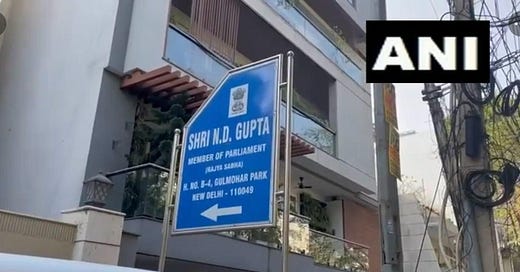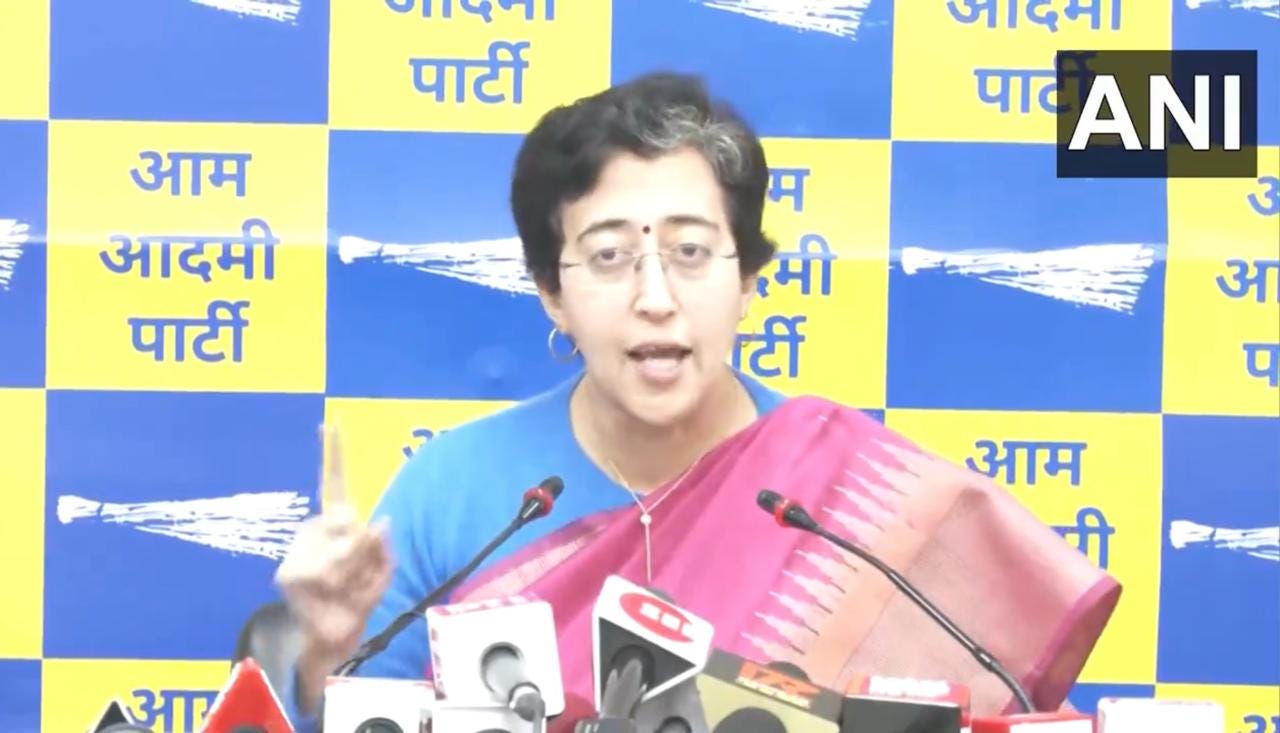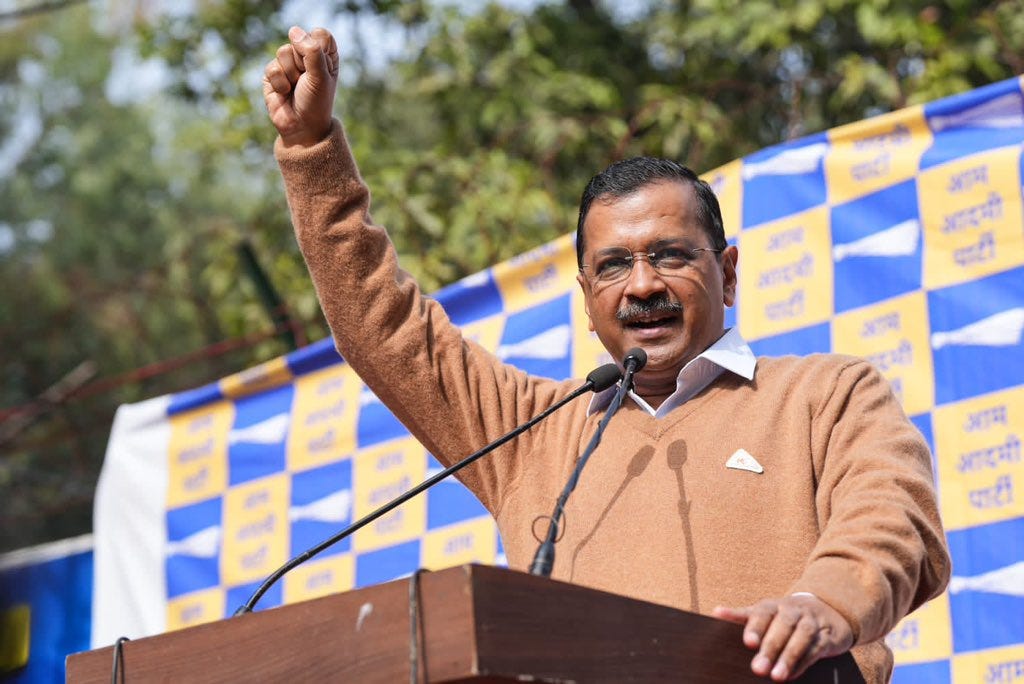ED Spreads its Dragnet to the Delhi Jal Board Rigged Tendering Probe
Enforcement Directorate Widens Investigation into Delhi Jal Board Tendering Anomalies—12 premises raided.
Expanded Investigation by the Enforcement Directorate
The Enforcement Directorate (ED) today intensified its investigation into the affairs of Delhi Jal Board (DJB) by conducting search operations at 12 locations throughout the national capital. These operations are a critical component of an extensive probe into purported anomalies in the DJB's tendering and work allotment processes. Among those targeted in the today’s raids are high-profile figures, including Aam Aadmi Party (AAP) Rajya Sabha MP Shri ND Gupta, who also serves as the Party's Treasurer, Bibhav Kumar, Chief Minister Arvind Kejriwal's Private Secretary, and Shalabh Kumar, a former member of the Delhi Jal Board. This move marks a notable escalation in the ongoing investigation, highlighting the ED's stated commitment to uncovering the money trial, if any, qua these allegations.
Recent Arrests and Allegations
In a notable development last week, the ED had arrested two individuals linked to the DJB case under the Prevention of Money Laundering Act (PMLA). These arrests, involving a retired Chief Engineer, Jagdish Kumar Arora and Anil Kumar Aggarwal, a contractor, stem from investigations into the tendering process's alleged irregularities. The ED's actions build on earlier raids conducted in July last year, underscoring the investigation's ongoing nature.
Two-pronged ED Investigation into Tendering Discrepancies
The Enforcement Directorate (ED) is meticulously examining two distinct cases of alleged tendering irregularities within the Delhi Jal Board (DJB), cumulatively amounting to about Rs 30 crores. The foundation of these investigations lies in separate FIRs filed by the Central Bureau of Investigation (CBI) and the Anti-Corruption Branch (ACB) of the Delhi Government, leading to a comprehensive probe into the processes followed by the DJB.
CBI's Findings on Undue Advantages
The CBI's investigation has brought to light accusations that DJB officials conferred undue advantages on NKG Infrastructure Limited. This preferential treatment allegedly facilitated the company's acquisition of a tender for the supply, installation, testing, and commissioning of electromagnetic flow meters, a process purportedly tainted by collusion with officials from NBCC (India) Limited. This case underscores concerns about the integrity of tendering practices within the DJB.
ACB's Allegations on Tender Awarding
Further complicating the scenario is the FIR lodged by the ACB in November 2022. This complaint alleges that the DJB improperly awarded a tender for the establishment of automated bill payment collection kiosks across its offices. The intention behind setting up these kiosks was to ease the bill payment process for consumers, yet the manner in which the tender was awarded has raised questions about the transparency and fairness of the DJB's procurement procedures.
These ongoing investigations by the ED, based on the allegations from the CBI and ACB, highlight significant concerns regarding the DJB's tendering and procurement processes, casting a spotlight on the need for stringent oversight and accountability within public sector undertakings.
Minister Atishi Raises Concerns Over ED's Conduct
In a significant development, Ms Atishi, a prominent minister in the Delhi government led by Chief Minister Arvind Kejriwal, leveled serious accusations against the Enforcement Directorate (ED) in a press conference held today, after the raids commenced. She alleged that the ED had deliberately erased or deleted audio tapes that contained oral examinations of individuals summoned or arrested. This action, according to Ms Atishi, was intended to manipulate the outcome of the ongoing investigations and obscure the truth.
Aitishi’s Allegations of Evidence Tampering
Ms Atishi claimed that the recent ED raids were strategically orchestrated by the ruling central government, utilizing what she described as its "pet agency." The aim, she asserted, was to not only pre-empt her planned disclosures but also to divert public attention from the alleged destruction of evidence by the ED. Furthermore, she criticized these actions as attempts to harass, humiliate and horrify AAP's officials and dedicated public servants.
Defiant Stance Against Intimidation
In a defiant response to the actions attributed to the Bharatiya Janata Party (BJP), Ms Atishi stated, "BJP is using agencies to scare AAP and its leaders. I would like to tell the central government that we are not going to be scared of these things at all. It's going on for the last 2 years but nothing has been found," showcasing her and her party's resilience in the face of ongoing scrutiny. This statement reflects a broader sentiment within the AAP, suggesting a steadfast commitment to counter the allegations and actions they perceive as politically motivated. Ms Atishi's bold accusations and the subsequent response have heightened the political drama surrounding the ED's investigations, casting a spotlight on the tense interactions between national agencies and regional political figures.
Observations on the Scope of ED Raids and DJB's Autonomy
As the Enforcement Directorate (ED) continues its operations, the specifics regarding seizures or arrests remain under wraps until later offical or court disclosures. Legal and political commentators have observed that the current raids do not directly tie to the allegations surrounding the Delhi Excise Policy money-laundering case. Nonetheless, the ED retains the authority to incorporate any relevant evidence from these raids into the broader investigation.
DJB's Governance and Financial Oversight
The Delhi Jal Board (DJB), a key autonomous entity funded by the Delhi Government, operates under the leadership of a senior IAS officer as its CEO, with political appointees serving as Chairperson and Vice-Chairperson. This structure delineates a clear division of responsibilities, ostensibly placing Chief Minister Arvind Kejriwal outside the immediate loop of tendering decisions, rate finalizations, and project executions. This arrangement underscores the complex governance framework within which the DJB operates.
Moreover, there have been intermittent claims, particularly from local BJP representatives, about the DJB's alleged delay in finalizing its annual accounts for several years. This purported lapse has reportedly hindered the statutory audit process by the Comptroller and Auditor General (CAG) of India, raising questions about transparency and accountability within the organization. A review of the DJB's official website did not yield any publicly available audited financial statements, further fueling these concerns.
These developments highlight the intricate dynamics between the ED's investigative pursuits and the governance mechanisms of the Delhi Jal Board, emphasizing the need for clarity and accountability in public sector operations.
Scrutiny on AAP's Financial Transactions: Focus on Shri ND Gupta
The involvement of the 78-year old ND Gupta, a distinguished Chartered Accountant and respected educational figure, who has been recently re-elected for a second six-year term in the Rajya Sabha, is drawing particular attention in the Enforcement Directorate's (ED) investigation. Serving as the National Treasurer of the Aam Aadmi Party (AAP), his position is now under the ED's scanner, hinting at an attempt to trace and link the financial flows within the AAP. This scrutiny suggests the ED's aim to establish a connection between the party's financial receipts, donations, and suspected illegal gains stemming from the alleged rigged tendering processes, described in the official Parlance as “proceeds of crime”.
Investigating the Money Trail
The focus on Shri ND Gupta highlights the ED's strategy to unravel the financial intricacies that might link the party's funds with suspected illicit activities. The investigation into these financial transactions could be used by ED to indirectly implicate Arvind Kejriwal, the National Convenor of AAP, if evidence suggesting a misuse of funds or illegal financial gains is found. This aspect of the probe underscores the comprehensive nature of the ED's investigation, aiming to map out the financial architecture of the AAP and identify any irregularities that might point to systemic issues within the party's financial management and governance.
The Road Ahead
The ongoing speculation surrounding the Enforcement Directorate's (ED) investigation into the AAP and its members remains just that—speculation—until definitive actions are taken in court. The true extent of any allegations and the detailed evidence supporting them will only become clear once the ED presents its formal charge-sheet or at least arguments before a competent judicial authority.
Focus on Upcoming Court Hearing
Currently, the focus shifts to the highly anticipated hearing at the Additional Chief Metropolitan Magistrate's court, Rouse Avenue, Delhi. Scheduled for February 7, this hearing will address the ED's statutory complaint against Chief Minister Arvind Kejriwal under Section 174 of the Indian Penal Code (IPC). The core issue at this juncture is Mr Kejriwal's alleged failure to respond to five consecutive ED summons, related to the investigation of the Delhi Liquor Scam.
This upcoming court hearing marks a critical moment in the ongoing saga, with potential implications for Kejriwal and the broader political landscape. As legal proceedings advance, the public and political analysts alike await the outcomes with keen interest, understanding that these developments could have significant repercussions for governance and political accountability in Delhi.







